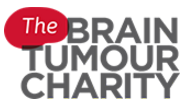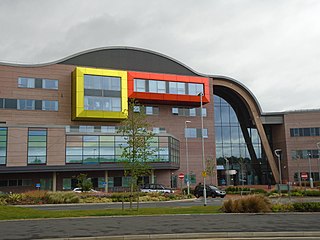
Cancer Research UK (CRUK) is the world's largest independent cancer research organisation. It is registered as a charity in the United Kingdom and Isle of Man, and was formed on 4 February 2002 by the merger of The Cancer Research Campaign and the Imperial Cancer Research Fund. Cancer Research UK conducts research using both its own staff and grant-funded researchers. It also provides information about cancer and runs campaigns aimed at raising awareness and influencing public policy.
The Institute of Cancer Research is a public research institute and a member institution of the University of London in London, United Kingdom, specialising in oncology. It was founded in 1909 as a research department of the Royal Marsden Hospital and joined the University of London in 2003. It has been responsible for a number of breakthrough discoveries, including that the basic cause of cancer is damage to DNA.

The Brain Tumour Charity is a UK-based, Charity Commission registered, charity dedicated to funding research, raising awareness of brain tumours, reducing diagnosis times and providing support and information for people with brain tumours, their families and friends.

The Freeman Hospital is an 800-bed tertiary referral centre in Newcastle upon Tyne, England. The hospital is managed by the Newcastle upon Tyne Hospitals NHS Foundation Trust and is a teaching hospital for Newcastle University.
Dana–Farber Cancer Institute is a comprehensive cancer treatment and research institution in Boston, Massachusetts. Dana–Farber is the founding member of Dana–Farber/Harvard Cancer Center, Harvard's Comprehensive Cancer Center designated by the National Cancer Institute, and one of the 15 clinical affiliates and research institutes of Harvard Medical School.

The European Organisation for Research and Treatment of Cancer (EORTC) is a unique pan-European non-profit clinical cancer research organisation established in 1962 operating as an international association under Belgium law. It develops, conducts, coordinates and stimulates high-quality translational and clinical trial research to improve the survival and quality of life of cancer patients. This is achieved through the development of new drugs and other innovative approaches, and the testing of more effective therapeutic strategies, using currently approved drugs, surgery and/or radiotherapy in clinical trials conducted under the auspices of a vast network of clinical cancer researchers supported by 220 staff members based in Brussels. The EORTC has the expertise to conduct large and complex trials especially specific populations such as the older patient and rare tumours.

Alder Hey Children's Hospital is a children's hospital and NHS foundation trust in West Derby, Liverpool, England. It is one of the largest children's hospitals in the United Kingdom, and one of several specialist hospitals within the Liverpool City Region, alongside the Royal Liverpool University Hospital, Liverpool Women's Hospital, Liverpool Heart and Chest Hospital, the Walton Centre, Mersey Regional Burns and Plastic Surgery Unit, and Clatterbridge Cancer Centre.

Blood Cancer UK, is a UK-based charity dedicated to funding research into all blood cancers including leukaemia, lymphoma and myeloma, as well as offering information and support to blood cancer patients.

The Sir Bobby Robson Foundation is a British cancer research charity which raises money to fund the early detection and treatment of cancer, and clinical trials of anti-cancer drugs. Based in the North East of England, the Foundation was launched on 25 March 2008 in the name of Sir Bobby Robson, himself a cancer sufferer five times since 1992, and who died of the disease on 31 July 2009.

The Queensland Children's Hospital (QCH) is a public children's hospital on Stanley Street in South Brisbane, Queensland, Australia. QCH is the primary facility of Children's Health Queensland, the state-wide Hospital and Health Service that provides specialist paediatric services, and the only hospital completely dedicated to paediatrics in Queensland. QCH has an emergency department, intensive and critical care unit, as well as specialist general medical and surgical services. Children's Health Queensland also provides clinicians and support staff to other hospitals, gives facilities access to paediatric specialists via telehealth, and local programs such as Child and Youth Mental Health Services (CYMHS).

Diffuse midline glioma (DMG), H3K27 altered, previously called diffuse intrinsic pontine glioma (DIPG) is a fatal tumour that arises in the brainstem, most commonly in the pons or thalamus. DMG is believed to be caused by genetic mutations that cause epigenetic changes in cells of the developing nervous system, resulting in a failure of the cells to properly differentiate. Currently, the standard of care is fractionated external beam radiotherapy, as the tumour location precludes surgery and chemotherapy has shown to be ineffective. However, the estimated survival post-diagnosis remains only 9–15 months.
The Robert Connor Dawes Foundation is an Australian not-for-profit organisation that facilitates funding in brain research, care and development in Australia and the United States. The foundation was created in June 2013 by Liz Dawes and Scott Dawes in memory of their son Robert Connor Dawes who died from a brain tumour in April 2013 at 18 years of age. As of July 31, 2015, they changed their name from Robert Connor Dawes Fund to Robert Connor Dawes Foundation.

Children's Cancer Institute is an Australian medical research institute wholly dedicated to the prevention and treatment of childhood cancer. Established in 1976, the Institute is affililiated with both the University of New South Wales and Sydney Children's Hospital and is located in Randwick, Sydney, New South Wales.
Hudson Institute of Medical Research is a leading Australian medical research institute recognised internationally for discovery science and translational research.
Ren Michael Pedersen OAM 4 February 1971, Atherton, North Queensland, Australia), is a prominent international advocate for children's brain cancer research.

Children with Cancer UK is a United Kingdom-based charity dedicated to raising money for research and providing care for children with cancer and their families. The aims of their research projects are to understand what causes children to get cancer and to develop improved treatments. The charity also organises days out and parties for families affected by childhood cancer.
Sir Alan William Craft is a British paediatric oncologist and Emeritus Professor of Child Health at Newcastle University. Craft was most notable for work as one of nine founders of the Children's Cancer Study Group, focusing his research on paediatric oncology, especially the epidemiology of bone tumours that further led to an oncology research unit which has been involved in aetiological studies and in particular the role of irradiation in the development of childhood cancer.

Professor Richard James Gilbertson is a paediatric oncology clinician scientist and a Senior Group Leader at the Cancer Research UK Cambridge Institute, University of Cambridge. He is the Li Ka Shing Chair of Oncology, and Director of the CRUK Cambridge Major Centre and the Children's Brain Tumour Centre of Excellence.
Christine J. Harrison is a Professor of Childhood Cancer Cytogenetics at Newcastle University. She works on acute leukemia and used cytogenetics to optimise treatment protocols.













